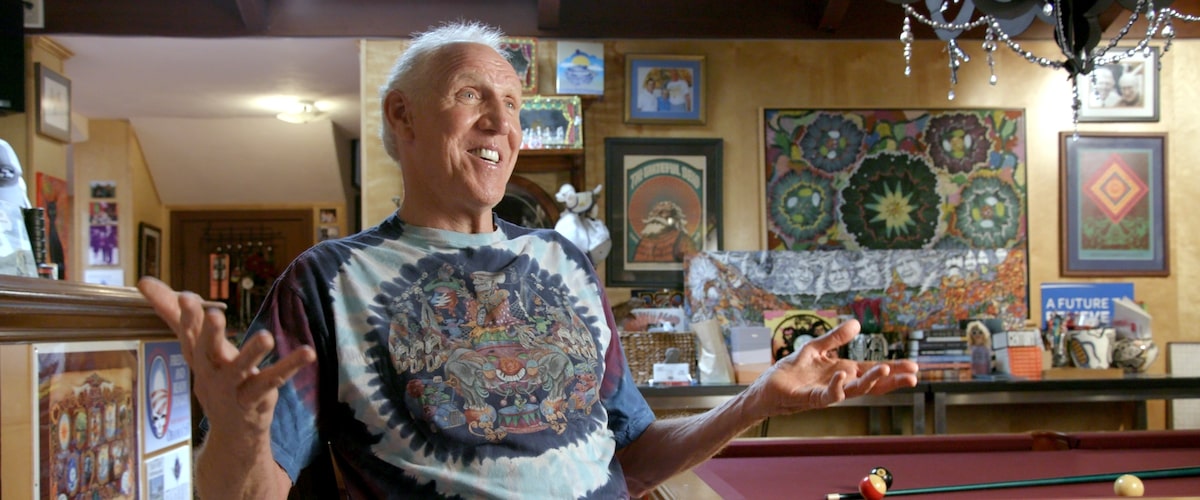One doesn’t so deeply insist on calling themselves “the luckiest guy in the world”—as NBA superstar and sportscaster Bill Walton does—without facing bad luck. As we learn from this jolly Steve James docuseries, the towering and ebullient Walton is known for hyperbole, for liberally using the word “fantastic.” But in the humble Hall of Famer’s mind, filled equally with Grateful Dead jams and gratitude, claiming the title is no stretch.
Even without today’s standards in sports, in which egos can be as big as paychecks, Walton is an enigma. In his heyday of playing center for the Portland Trail Blazers in the ’70s, he was a humble hippie and outdoorsy guy, a vegetarian who stood out with his 6′ 11″ frame and preferred mode of transportation (a bike). Due to a stutter, he hardly talked on camera. Walton focused most of all on becoming a great basketball player, having followed in the long lunges of Kareem Abdul Jabbar at UCLA. He made Portland a home for his free spirit, legendary jump hook, and radical thinking.
Walton’s life story is in great hands with director James, who has a rare touch for sports and the people who play them (“Hoop Dreams,” “Prefontaine”). In long drives, James nerds out about specific matches with those who shared the spotlight with Walton, especially when Walton made his way to the NBA Finals with the Blazers in ’77, and later the Celtics in ’86. But the interest in this formal but compelling project is primarily about emotional memorabilia, and so we are treated with a bounty of off-the-cuff remembrances from his peers like Larry Bird, Abdul Jabbar, World B. Free, and others. James creates the kind of reunions in which friends, family, and teammates are one and the same, and anecdotes abound. It makes you giddy to hear what was shared off the record, but in this rare case, it’s obvious there wasn’t anything bad said about Walton.
James tells this on-court career in loving detail, with a great focus on his emotional downfall when foot and knee injuries began to cause him to sit out for hundreds of total games, while contracts ensured he made money in the process. The documentary doesn’t quite complete the thought about how a bike-riding hippie could also become the highest-paid player at the time, but it does get at the emotional core of how those deals didn’t make Walton’s lack of playing, and the guilt from letting down his teammates, any easier to accept. In less jovial moments, Walton has a stark seriousness on-camera that hints at how he felt during his darkest years.
Throughout James’ docuseries, Walton is adorned in tie-dye shirts, proclaiming a love for the Grateful Dead that has been long-lasting and soul-filling. He discovered the music of Jerry Garcia and company while ascending as a basketball phenomenon, and he has only sought to pass on the vibes. (“Bill turned us all into Grateful Dead fans,” Larry Bird remarks.) And the band helps tell his story: James places a full trove of Grateful Dead songs over Walton’s gameplay footage, and puts a tie-dye framing to the doc’s more typical photo-driven sections. As “The Luckiest Man in the World” goes back and forth in his career, highlights fellow teammates like Maurice Lucas, and shows off Walton’s rocker-themed bedrooms, the Dead’s presence here becomes instructive. This four-hour docuseries is just jamming, man.
As a “30 for 30” installment, the docuseries is beholden to filling hour-long episodes, so this one gives you everything. James develops an emotional narrative that will be most moving for those who don’t know the full story—like the revelation of how Walton became a sportscaster after decades of hiding from public speaking. But it’s also for those who appreciate gameplay technique, told by its main players recalling some of the biggest days of their lives.
Still, the doc’s most moving passages involve the present day, an epilogue for an on-the-court career that has an older Walton showing us around sunny Portland. He points out the home that he shared with fellow radicals (he put a water bed on the roof), and meets high school-age basketball players who are honing their skills on the same court he used. His parting advice to them is hilariously anti-modern basketball commercialism: “No sodas.”
Walton’s tale predominantly wrestles with inner adversity, and while there are a few funky and curious passages about his celebrity—like when Walton fell into the circle of the Patty Hearst scandal—it’s mostly about the spiritual and physical endurance of this tie-dyed b-baller. At the end, when James says to Walton from off-camera, “But you aren’t the luckiest guy in the world,” Walton’s smile doesn’t break. Like with his work on the court, Walton is more concerned in life with wins than stats. A title like “the luckiest guy in the world” isn’t just handed to you; it is won.
Full series screened for review. The first two episodes of “30 for 30: The Luckiest Guy in the World” premieres on ESPN+ on June 6, with the last two premiering the following week.




















